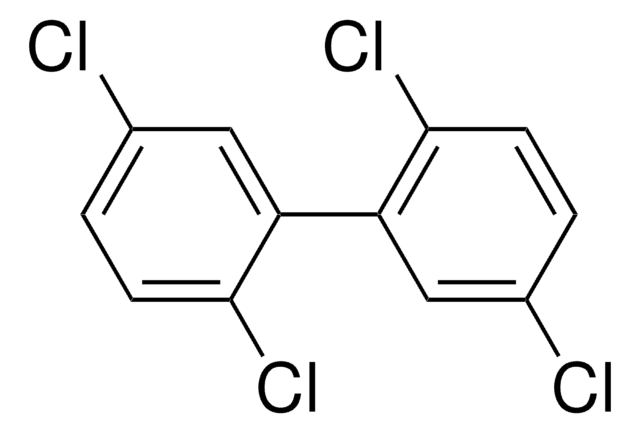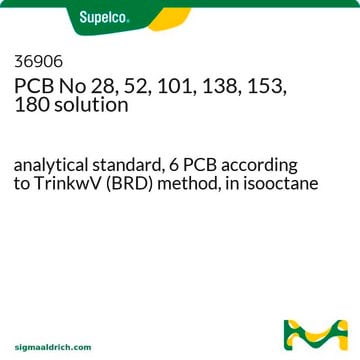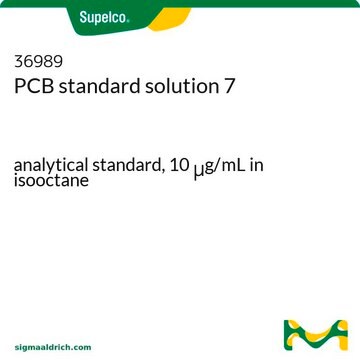35596
PCB No 3
analytical standard
Synonym(s):
4-Chlorobiphenyl, 4-PCB
Sign Into View Organizational & Contract Pricing
All Photos(1)
About This Item
Empirical Formula (Hill Notation):
C12H9Cl
CAS Number:
Molecular Weight:
188.65
Beilstein:
774966
Ballschmiter Number:
3
EC Number:
MDL number:
UNSPSC Code:
41116107
PubChem Substance ID:
NACRES:
NA.24
Recommended Products
grade
analytical standard
shelf life
limited shelf life, expiry date on the label
technique(s)
HPLC: suitable
gas chromatography (GC): suitable
application(s)
environmental
format
neat
SMILES string
Clc1ccc(cc1)-c2ccccc2
InChI
1S/C12H9Cl/c13-12-8-6-11(7-9-12)10-4-2-1-3-5-10/h1-9H
InChI key
FPWNLURCHDRMHC-UHFFFAOYSA-N
Looking for similar products? Visit Product Comparison Guide
General description
Polychlorinated biphenyls (PCBs) belong to the class of highly toxic pollutants commonly found in various environmental matrices and food products. They find a variety of applications as flame retardants, plasticizers, dielectric and heat transfer fluids, etc.
Application
PCB No 3 may be used as an analytical reference standard for the quantification of the analyte in aqueous solution in the presence of dissolved organic carbon using high-performance liquid chromatography technique.
Refer to the product′s Certificate of Analysis for more information on a suitable instrument technique. Contact Technical Service for further support.
Recommended products
Find a digital Reference Material for this product available on our online platform ChemisTwin® for NMR. You can use this digital equivalent on ChemisTwin® for your sample identity confirmation and compound quantification (with digital external standard). An NMR spectrum of this substance can be viewed and an online comparison against your sample can be performed with a few mouseclicks. Learn more here and start your free trial.
Signal Word
Warning
Hazard Statements
Precautionary Statements
Hazard Classifications
Aquatic Acute 1 - Aquatic Chronic 1 - STOT RE 2
Storage Class Code
11 - Combustible Solids
WGK
WGK 3
Flash Point(F)
Not applicable
Flash Point(C)
Not applicable
Personal Protective Equipment
dust mask type N95 (US), Eyeshields, Gloves
Choose from one of the most recent versions:
Already Own This Product?
Find documentation for the products that you have recently purchased in the Document Library.
Customers Also Viewed
G Luthe et al.
Acta crystallographica. Section B, Structural science, 63(Pt 2), 319-327 (2007-03-22)
Accurate structure determinations by X-ray crystal analysis and computation using semi-empirical self-consistent field molecular orbital calculations are described and compared for five monofluorinated analogues of 4-chlorobiphenyl, i.e. 2-fluoro-4-chlorobiphenyl, 2'-fluoro-4-chlorobiphenyl, 3-fluoro-4-chlorobiphenyl, 3'-fluoro-4-chlorobiphenyl and 4'-fluoro-4-chlorobiphenyl. Intermolecular interactions for all monofluorinated isomers are
Anna Ptak et al.
Reproductive toxicology (Elmsford, N.Y.), 20(1), 57-64 (2005-04-06)
Theca interna and granulosa cells from small, medium and large preovulatory porcine follicles were cultured as a monolayer to compare the effects of 4-chlorobiphenyl (PCB3) and its metabolites on estradiol secretion. Cells were treated with PCB3 or its mono- and
J A Jacobus et al.
Environment international, 36(8), 970-979 (2010-08-27)
Polychlorinated biphenyls (PCBs) are a class of persistent organic pollutants with myriad biological effects, including carcinogenicity. We present data showing gender-specific genotoxicity in Fischer 344 transgenic BigBlue rodents exposed to 4-chlorobiphenyl (PCB3), a hydroxylated metabolite, and the positive control 3-methylcholanthrene
Kiran Dhakal et al.
Chemical research in toxicology, 25(12), 2796-2804 (2012-11-10)
Polychlorinated biphenyls (PCBs) are legacy pollutants that exert toxicities through various mechanisms. In recent years exposure to PCBs via inhalation has been recognized as a hazard. Those PCBs with lower numbers of chlorine atoms (LC-PCBs) are semivolatile and have been
Anna Ptak et al.
Toxicology letters, 166(3), 200-211 (2006-09-05)
Polychlorinated biphenyl (PCBs) levels of tens and hundreds of pg/ml for individual congeners are measured in human follicular fluid. PCB3 (4-chlorobiphenyl), caused a significant increase in estradiol secretion in porcine granulose-theca cell co-cultures and its two metabolites, 4-OH-PCB3 and 3,4-diOH-PCB3
Our team of scientists has experience in all areas of research including Life Science, Material Science, Chemical Synthesis, Chromatography, Analytical and many others.
Contact Technical Service











